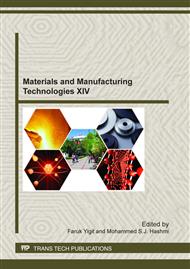p.189
p.195
p.201
p.207
p.213
p.219
p.225
p.231
p.237
Statistical Evaluation Tensile Properties of High-Density Polyethylenes
Abstract:
The mechanical properties, among all the properties of plastic materials, are often the most important properties because virtually all service conditions and the majority of end-use applications involve some degree of mechanical loading [1]. In the present work three different commercial polyethylene materials are tensile tested at four or five different tensile rates and two or three temperatures. Tensile test results against tensile rate include stress at 0.5 % elongation, tensile strength, yield strength, modulus of elasticity, elongation at yield and % elongation are determined. It is concluded that the structure, chain lengths and branching rates of polymer matrix significantly effected tensile test curve characteristic.
Info:
Periodical:
Pages:
213-218
DOI:
Citation:
Online since:
January 2012
Authors:
Keywords:
Price:
Сopyright:
© 2012 Trans Tech Publications Ltd. All Rights Reserved
Share:
Citation:


